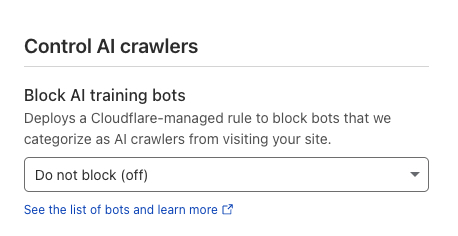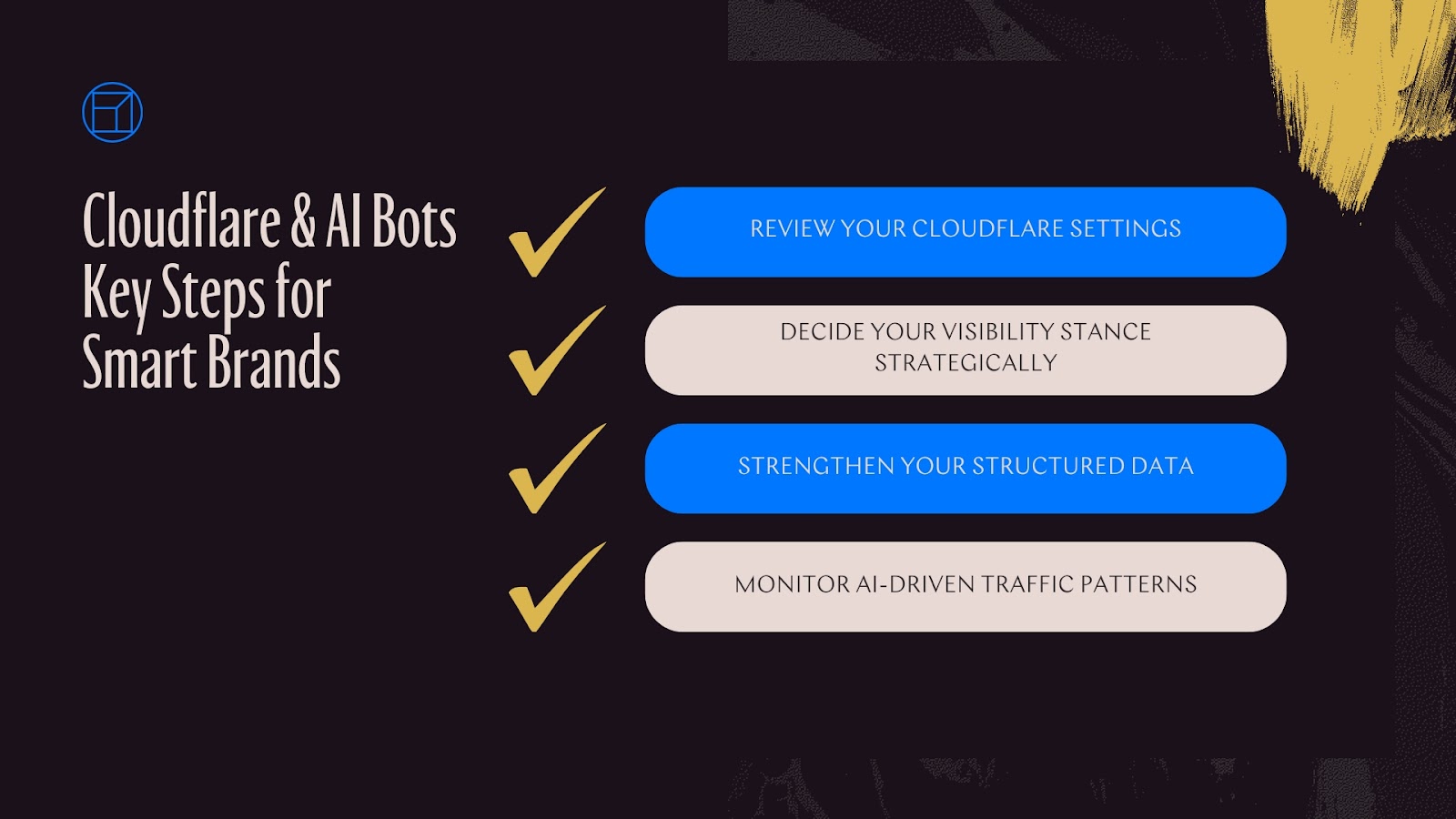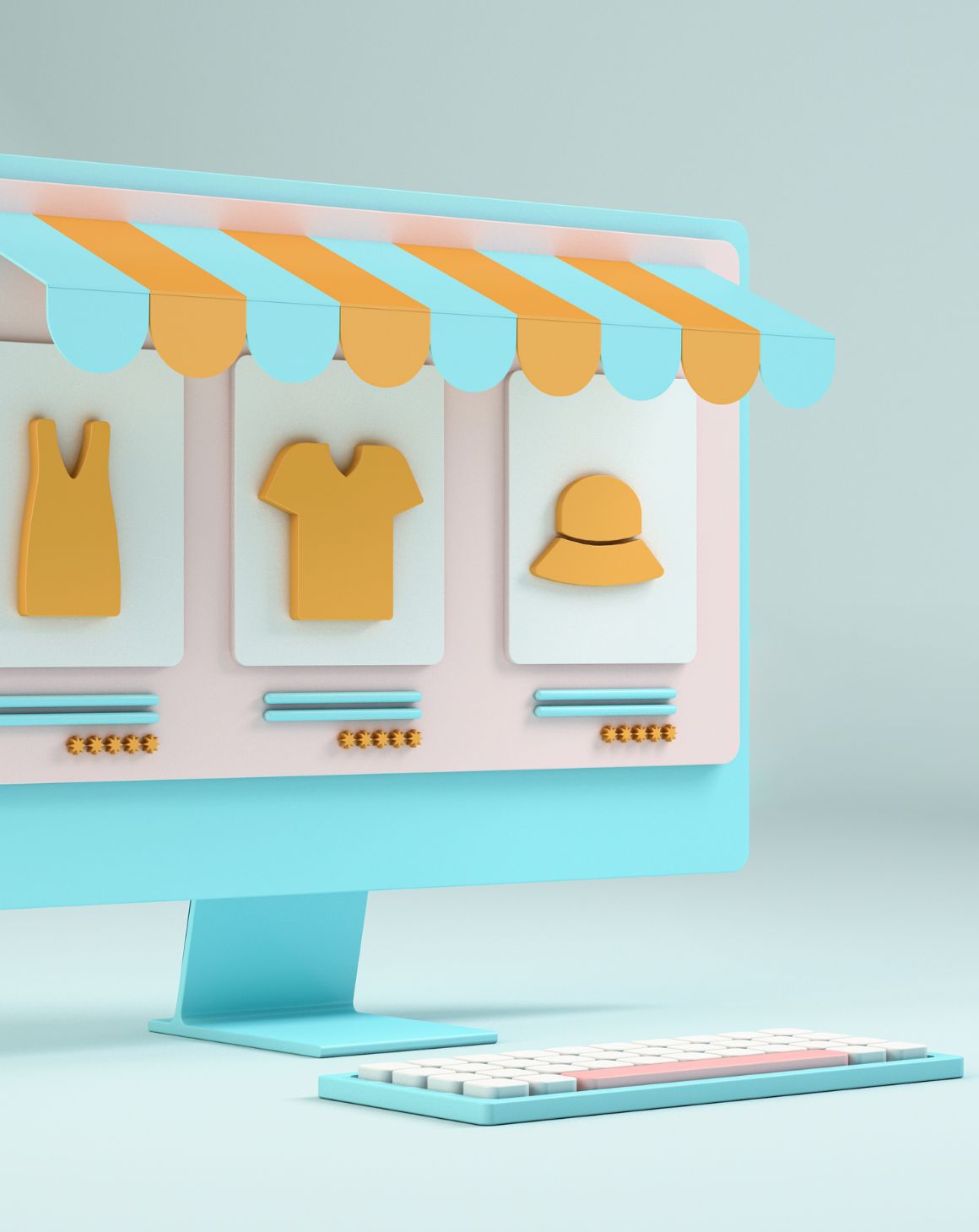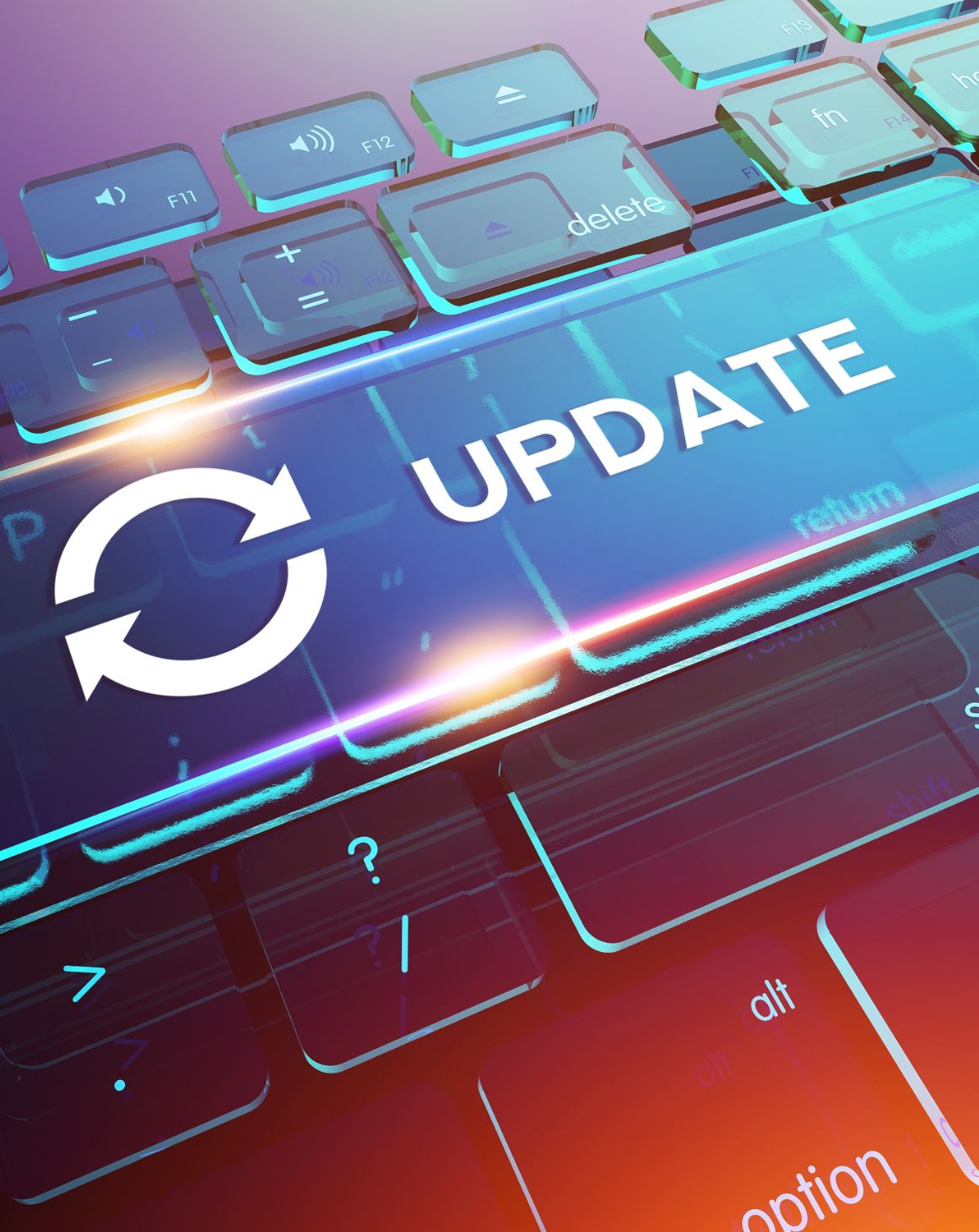If you're an eCommerce brand using Cloudflare, there’s a setting you need to know about. To give site owners more control over how AI accesses their content, Cloudflare has introduced a feature that blocks AI crawlers (e.g., OpenAI’s GPTBot and ChatGPT-User) by default for new domains.
The setting is presented as a safeguard, but it could easily become a blind spot. While it defaults to “ON” only for new domains, existing Cloudflare sites may have unknowingly activated this block through dashboard updates, configuration changes, or default bot rules.
And here’s the reality: If these bots can’t access your site, your brand may be entirely excluded from AI-driven shopping experiences, including those built into Shopify’s own ChatGPT integrations.
At Blue Wheel, we’re advising eCommerce clients to treat AI visibility the same way they treat SEO: as a foundational component of digital discovery. If you’re not accessible to ChatGPT, you’re not part of the conversation.
What’s Happening with Cloudflare and AI Bots?
Cloudflare, which powers a significant portion of the internet—including many Shopify storefronts—announced that:
- AI crawlers will be blocked by default on all new Cloudflare domains
- Site owners can now choose to allow, deny, or charge AI bots (via a “Pay Per Crawl” model)
- The company is actively tracking and verifying AI crawler behavior, especially bots that ignore robots.txt
This change currently applies to new domains. However, existing domains, especially those that have undergone recent settings changes, audits, or dashboard updates, may have unintentionally enabled this block. That means your site could be affected even if you’re not a new user.

Why This Matters for eCommerce
AI is quickly becoming the first point of contact between shoppers and products. Tools like ChatGPT now offer product summaries, comparisons, and recommendations directly in chat—often before a user visits a website.
This shift has become especially urgent for Shopify merchants. As of May 15, 2025, OpenAI has officially added Shopify as a data provider in ChatGPT’s shopping search experience (OpenAI Docs).
The integration means product listings from Shopify-powered stores can now appear in ChatGPT Shopping results. For DTC brands, this opens up a powerful new layer of organic visibility—one not dependent on paid ads, marketplaces, or traditional SEO.
If your product pages, blogs, or reviews are blocked from being crawled, your brand may be excluded from these experiences entirely, regardless of how well-optimized your SEO is.
Visibility no longer guarantees traffic. AI platforms increasingly serve content directly in the chat interface without sending users to the source. But these answers still influence purchasing decisions.
Your brand risks becoming invisible in this new discovery layer if your product detail pages (PDPs) and structured content aren’t accessible to AI. Brands that optimize for AI will succeed. If your site is built for retrieval, you’ll show up. If not, someone else will.
What Should Smart Shopify Brands Do Right Now?
1. Review Your Cloudflare Settings
Check if AI crawlers are being blocked. If you’re on a new domain using Cloudflare, you may already be opted out without realizing it.
2. Decide Your Visibility Stance Strategically
We advise most Shopify brands to opt in to AI crawling on product and content pages. Early discoverability has long-term advantages. Holding out for compensation isn’t a viable strategy for eCommerce visibility.
3. Strengthen Your Structured Data
Ensure you’re using full Product, Review, FAQ, and Breadcrumb schemas. AI tools require this structure to interpret and represent your content correctly.
4. Monitor AI-Driven Traffic Patterns
While traditional analytics won’t yet label “ChatGPT” or “Anthropic” referrals, pay close attention to branded search growth, direct traffic, and product page entry points—these could signal invisible AI influence.

The Bigger Picture: A Shift Toward AI Gatekeeping
Cloudflare’s move is more than a technical safeguard, as it signals a new era of data gatekeeping and permission-based discovery. Platforms want access. Brands want visibility. Everyone’s redefining what a fair exchange looks like.
And for eCommerce? The strategic question isn’t “How do we stop AI from accessing our site?” It’s: “How do we shape the way AI discovers and represents our brand?”
That means leaning into structured content, AI-compatible crawling, and long-term visibility infrastructure—while the rest of the market plays defense.
Final Thoughts
If your store disappears from AI discovery because of a default setting, that’s not a technology problem. That’s a strategic oversight.
Today, eCommerce visibility goes beyond SEO. It’s about being discoverable wherever modern shoppers make decisions, and AI is quickly becoming one of those places.
We Help Shopify Brands Stay Visible in an AI-First World
At Blue Wheel, we help eCommerce brands adapt their content, structure, and discovery strategy for an AI-powered web. Whether you need to review crawler access, rework schema, or build a visibility roadmap, we’re ready to lead.
Book an AI Visibility Audit. Let’s ensure your brand is showing up where it matters.
FAQs
What is the primary concern for eCommerce brands using Cloudflare regarding AI crawlers?
The issue is that a default setting in Cloudflare could exclude their site from AI-driven shopping experiences. This means their brand and products may not be visible in AI tools like ChatGPT, which increasingly provide product summaries and recommendations directly to shoppers, effectively making them invisible in a new and important discovery layer.
What specific Cloudflare setting could be blocking AI crawlers for eCommerce sites?
Cloudflare has introduced a feature that blocks AI crawlers by default for new domains. This setting could be blocking AI crawlers for eCommerce sites. While it defaults to "ON" only for new domains, existing Cloudflare sites may have unknowingly activated this block through dashboard updates, configuration changes, or default bot rules.
How should smart Shopify brands address AI visibility concerns?
Check if AI crawlers are being blocked, as new domains using Cloudflare might be opted out by default. Most Shopify brands should allow AI crawling on product and content pages, since early discoverability offers long-term advantages. Ensure the use of full Product, Review, FAQ, and Breadcrumb schemas, as AI tools rely on this structure to interpret content.







.png)
.png)
.avif)